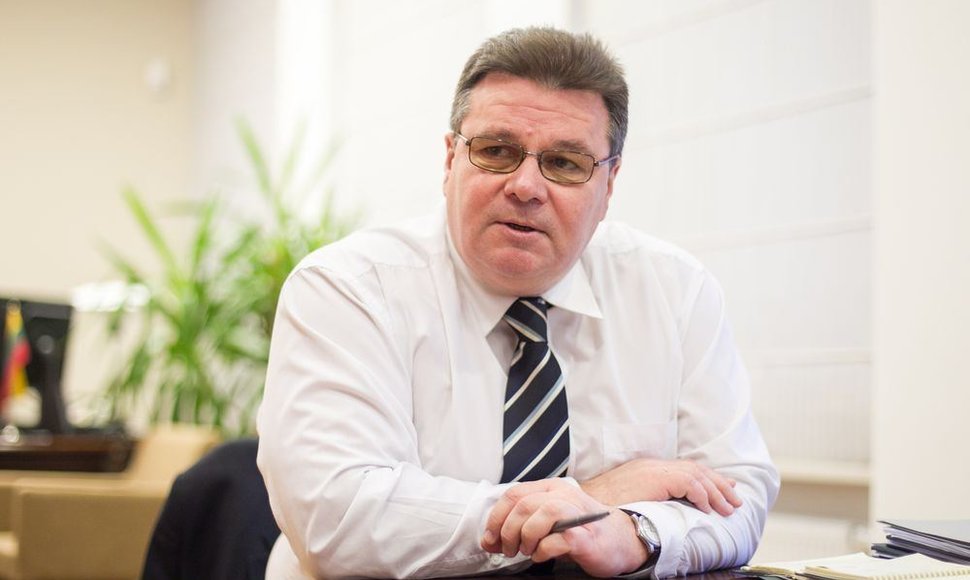Participants of the meeting of foreign and security policy experts in the Lithuanian town of Trakai said they were more eager to hear Ukraine's decision on which path it would take – that of EU integration or integration into the structure established by Russia.
"We know that these processes are taking place. We know there are ambitions to establish the Eurasian Union, the process is taking place. If someone believes that it's just some big political statement, to my mind, they are wrong," Linkevičius told reporters following the traditional Snow Meeting.
"It’s a very tangible structure that is arriving. (…) I would single out Ukraine. It’s very interesting where it's going to turn. Considering both the Eastern Partnership and Eurasia, the role of such a large country like Ukraine is important," the minister said.
The Eurasian Union with Russia, Belarus, and Kazakhstan as members has become one of Moscow's priorities in recent years. Russia wants it to evolve into the Eurasian Economic Union.
Over 1,000 people currently work at the Commission of the Eurasian Customs Union, and the Court of the Eurasian Economic Community was established last year.
Some observers call it a challenge to the EU Eastern Partnership project as Eastern neighbors of the EU are obliged to choose one of the directions.
The ex-Polish Minister of Defense, Member of the Senate, Bogdan Klich called the Eurasian Union a political project aimed at showing off Moscow's influence.
"I wouldn't exaggerate with the concept of the Eurasian Union. I have an impression that it is rather a political project, although it has an economic dimension," Klich said.
In his opinion, Ukraine will be the one that will feel the competition between Moscow and Brussels most.
"Of course, there will be competition between the offer that comes from Moscow and the one that comes from Brussels, mainly to Ukraine, and it will be the test for Brussels by the end of this year," Klich said.
Meanwhile, asked whether the Eurasian Union project was a challenge for the West and Eastern Europe, Constanze Stelzenmueller, a representative of the German Marshal Fund, said: "No, I don't think so."
"I think it's a Russian mimicry of Western institutions without understanding neither normative culture of those institutions nor their normative context. Therefore, I don't think it will seriously evolve into something. I don't think it has a future," the German expert said.
In her words, the Eurasian project might have certain smaller goals than the establishment of a continental block but "they are clearly visible."
"The thing is we no longer live in the Cold War and today, even powerful countries, and Russia still is a powerful country, need to be able to persuade; in other words, they need soft power. Russia's soft power is pretty limited even in its neighborhood. Because the neighborhood is fragile, because the number of states in Russia's western neighborhood are unsure of their own destiny, Russia can still threaten a little bit, bully a little bit, but it doesn't really have a lot of power in positive persuasion. For the simple reason - Russia itself is not a good model to follow", Stelzenmueller said.
Director of the Paris-based Foundation for Strategic Studies, Camille Grand, said Moscow wants to strengthen its leadership with this project but it might seem acceptable to all post-Soviet countries.
"Obviously, it is an attempt by Russia to establish its leadership in the near abroad. I am not sure this will work because, obviously, the interests of participants may lie elsewhere, whether it is closer relations with the European Union or other directions. It is unclear if the dynamics will go much further," Grand said.
Robert Nurick of the Washington-based analytical center Atlantic Council told BNS the Eurasian Union was more aimed at binding countries of the so-called near abroad with Moscow and preventing them from pursuing Western integration, rather than reconstituting the Soviet Union.
"I don't think it's an attempt to reconstitute the Soviet Union for a very simple reason which is I don't think that Moscow wants to accept the responsibilities that would go with that process. I think what they do want is deference and dominance; it's not a question of changing an institutional relationship. What that means in particular is a set of arrangements which will make it very difficult for these countries to integrate further with the West. I think it is a very high priority for Mr. Putin," the US expert said.
"I suspect that he's gonna be disappointed. At least as far as the Eurasian Union is concerned, because what these goals involve is limitation on sovereignty of these countries which, in most cases, I think, they're anxious to protect," Nurick said adding that Ukraine was "the big prize" in the Russian-initiated process.
Georgian Minister of Foreign Affairs Maya Pandzhikadze said her country is not interested in the Eurasian Union.
"The European Union is the only union we will join, and NATO is the only alliance we will join," she said.
An EU Eastern Partnership summit will take place in Vilnius in November.












